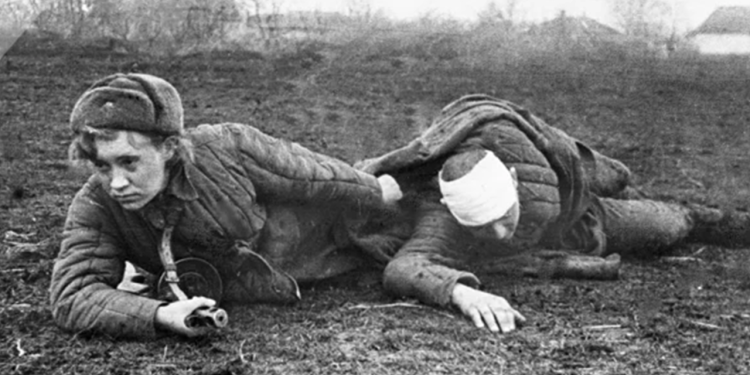NEWS CENTER – One of the most common jobs held by Soviet women was that of combat medic. Combat medics are not to be confused with nurses, medical assistants, and doctors working in field hospitals. Medics were armed and part of the infantry, expected to participate in battle when not treating the wounded. They carried their comrades off the battlefield and administered medical aid, all while under fire.
When the war broke out Mariya Borovichenko enrolled in nursing school. As the Germans advanced on Kiev, she escaped, gathering valuable information she passed along to the 5th Airborne Brigade. With her intelligence, they were able to destroy some of the enemy’s artillery. Borovichenko proved useful as a scout and a medic so the 5th Airborne allowed her to accompany them. In addition to her medical knowledge, she demonstrated that she could also handle weapons, firing on the battlefield as she treated the wounded. Borovichenko continued to prove her skills as a medic and as a scout. In September 1941 while on a scouting mission she captured 10 Germans singlehandedly and provided intelligence back to her superiors. Borovichenko’s final battle was in July 14, 1943. After knocking out an advancing tank with an anti-tank grenade, she was killed by shrapnel shielding a wounded officer. In 1965 she received the Hero of the Soviet Union award.
Another examplary women that fought in the Patriotic War was Maria Petrovna Smirnova, she shared her memories in the book The Unwomanly Face of War An Oral History of Women in World War II:

I was born and grew up in Crimea, near Odessa. In 1941 I finished tenth grade in the Slobodka high school, Kordymsky district. When the war began, I listened to the radio for the first few days. I realized that we were retreating. I ran to the recruiting office. They sent me home. I went there twice more and was refused twice more. On July 28 the retreating units passed through our Slobodka, and I went to the front with them without any call-up.
When I first saw a wounded man, I fainted. Later I got over it. When I went under fire to a wounded soldier for the first time, I screamed so loud that it seemed I drowned out the noise of the battle. Then I got used to it…Ten days later I was wounded. I extracted the shrapnel myself, and bandaged myself. December 25, 1942…Our 333rd Division of the 56th Army occupied an elevation on the approach to Stalingrad. The enemy decided to take it back at all costs. A battle began. Tanks attacked us, but our artillery stopped them. The Germans rolled back, and a wounded lieutenant, the artillerist Kostia Khudov, was left in no-man’s-land. The orderlies who tried to bring him back were killed. Two first-aid sheepdogs (this was the first time I saw them) crept toward him, but were also killed. And then I took off my flap-eared hat, stood up tall, and began to sing our favorite prewar song: “I saw you off to a great deed,” first softly, then more and more loudly. Everything became hushed on both sides—ours and the Germans’. I went up to Kostia, bent down, put him on a sledge, and took him to our side. I walked and thought: “Only not in the back, better let them shoot me in the head.” So, right now…right now…The last minutes of my life…Right now! Interesting: will I feel the pain or not? How frightening, mama dear! But not a single shot was fired…
We could never have enough uniforms: they’d give us a new one, and a couple of days later it was all bloody. My first wounded man was First Lieutenant Belov, my last was Sergei Petrovich Trofimov, sergeant of a mortar platoon. In 1970 he came to visit me, and I showed my daughters his wounded head, where he still had a big scar. Altogether I carried 481 wounded soldiers from under fire. One of the journalists counted them up: a whole infantry battalion…We hauled men two or three times our weight. When they’re wounded they’re still heavier. You carry him, his weapon, plus there’s his overcoat, boots. So you hoist some 180 pounds on your back and carry it. Unload it…Go for the next one, and again it’s 150 or 180 pounds…Five or six times in one attack. And you yourself weigh a hundred pounds—like a ballet dancer. It’s hard to believe now…I myself find it hard to believe…




